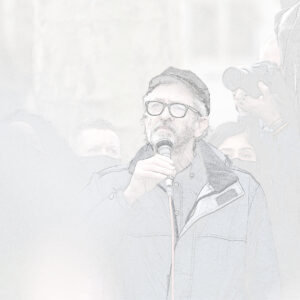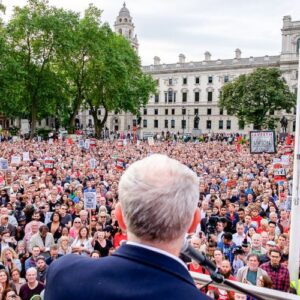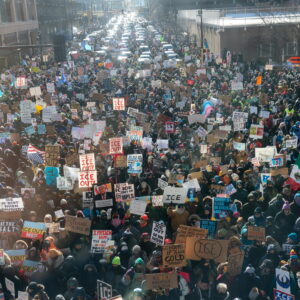Source >> Michael Roberts blog
Today (6 May) in Britain King Charles III will be crowned in a ‘coronation’. All the other remaining monarchies in Europe (Scandinavia, Netherlands, Belgium, Spain) don’t bother with a coronation, but the British monarchy has had a much more prominent role in helping British state build its huge global empire in the 19th century. A coronation is part of the rituals developed to cement this feudal relic into the state machine.
The cost of the coronation to public funds is estimated at £100m. The British royal family could easily afford to pay for this jamboree itself. Recent calculations put the personal wealth of Charles at £1.8bn. Some estimates put that even higher. The British monarch is “one of the world’s wealthiest individuals” according to the Financial Times, owning property worth £15.6 billion as well as the £1.8 billion held in lands called the Duchies of Cornwall and Lancaster. Brand Finance, a brand valuation consultancy, puts the whole family’s wealth at £44 billion!
A key part of the monarch’s wealth is the land that they claim to own. The royal family owns more than 1% of all the land in the UK – by comparison, the top 10 landowners in the United States collectively hold 0.7 percent of the land.

The family’s right to these lands and the income earned from them is dubious. Surely, these lands should be part of the national estate, not owned by one family. Indeed, after the civil war in England in the mid-1640s, when England had a republic for ten years under Cromwell, these lands were nationalised. With the restoration of the monarchy under the last King Charles, the Stuart royal family regained them. It was the policy of the Labour Party in the 1930s to bring them into public ownership – but the Labour government after WW2 failed to implement that.
The Duchy of Cornwall estate has grown to more than 130,000 acres in 20 counties in southern England and Wales. The assets include farmland and woodlands, as well as the Oval cricket ground in London, offices, vacation rentals and residential developments. The family also benefits from the Crown Estate — yet another collection of land holdings, this one originating from the Norman Conquest in the 11th century. Today, this £15.6 billion ($19.4 billion) portfolio includes marquee properties such as London’s Regent Street, the Windsor Estate, shopping malls, much of the coastline and even the seabed out to 12 nautical miles offshore. Wind farm leases on the seabed are contributing to soaring profits.
Different from the duchies, the Crown Estate is managed by the government and its profits go to the state treasury. But a set percentage then goes to the royals in the form of the “Sovereign Grant,” earmarked for official travel and entertainment, property upkeep and staff salaries. A “golden ratchet” clause means the yearly grant can’t go down even if profits do. The latest Sovereign Grant amounted to £86.3 million — or £1.29 per person in Britain (roughly $1.60). In addition, security for the royal family is paid for separately out of the Metropolitan Police’s budget, and this is estimated to be considerably greater than the sovereign grant.
Other parts of the British monarch’s huge wealth are in obscure possessions like the royal philatelic collection, considered the best stamp collection in the world, containing hundreds of thousands of stamps, some of which were harvested by Charles’s great-grandfather, George V, from the British Post Office and colonies, worth at least £100m. Also, Charles’ father Philip and the king’s grandmother, the queen mother, were avid collectors of art and purchased many pieces at bargain prices that would, if sold today, realise many times the original price tag. They include a Monet bought by the queen mother in Paris shortly after the second world war, when prices were low, for £2,000. An art valuer estimated it could now be worth £20m. In addition, almost 400 pieces of art that known (there may be more) in the “private” or “personal” royal collections are valued at £24m. Many of these were ‘gifts’ from foreign potentates.
The crown that King Charles III will wear at today’s coronation is five pounds in weight of solid gold, velvet, ermine and gems. Another crown is adorned with 2,868 diamonds. Charles will also be handed bejewelled scepters, swords, rings and an orb. Afterwards, he will travel through the streets of London in a golden carriage. Indeed, the value of all the 54 privately owned jewels ‘owned’ by the monarch is estimated at £533m.
And there are some other bizarre private rights. The new king will technically own all the swans in England and Wales, and a number of sea creatures, including all the whales, dolphins and porpoises in the waters around the United Kingdom.
These are the physical assets, but also the royals get free services eg they live in palaces and other homes funded by the state but for their own exclusive personal use. Indeed, there is a real difficulty in disentangling the family’s private wealth from public ownership. The Royal family has a fleet of luxury cars for their use in public activities and events. But these “state cars” are often used privately, such as when Princess Eugenie, who has never been a working royal, arrived at her wedding in a “state” 1977 Rolls-Royce Phantom VI worth £1.3m.
A recent policy states that gifts received in an “official capacity” are “not the private property” of the royal family. Still, the ambiguity of “official” allowed the late Queen Elizabeth to claim horses from world leaders as personal gifts that didn’t need to be declared.
And then there is tax. Or the lack of it. Charles did not pay a single penny of inheritance tax on the fortune the late Queen left him last year. The £1bn Duchy of Cornwall estate – previously inherited by Charles and recently passed on to his heir Prince William – is not liable for either corporation tax or capital gains tax. The Duchy of Lancaster provides whoever sits on the throne with lucrative annual payments of around £20m a year. Again, no tax. Charles has “volunteered” to pay income tax. As the Guardian newspaper put it: “Volunteering to pay tax feels a little like a wanted criminal volunteering to hand himself over to the authorities. It doesn’t seem to be something the rest of use typically get a choice in.” It is compulsory for the rest of us as part of a social contract that does not apply to this royal family.
The usual response to these points is that the British monarch is doing the country a ‘public service’. And King Charles is apparently keen to ensure that he is seen to do this. And even more that we should all do our bit. Charles has urged everybody to celebrate his kingship by helping out at the local food bank.
The British monarchy is a particular example of an archaic feudal institution that has been converted into a capitalist one for the purpose of representing and enhancing the idea of empire. The British empire, built up from the mid-18th century until the end of the 19th century, was one of the greatest imperialist projects ever. Sustaining an inherited family monarchy on top was a vital ingredient in sustaining the empire.
The current British royal family are called the Windsors. They had only a tenuous claim to being the current royal family. The royal website admits there were 52 candidates with a better claim to the throne than the Windsors’ ancestor, Georg Ludwig, Elector of Hanover, when he became George I in 1714. So they are German in origin and were originally called ‘Saxe-Coburg and Gotha’ – until the first word war with Germany forced a name change in 1917. The family were closely related to both the German and Russian absolute monarchies.
Many in the family have had extreme political views. A book by the US biographer Kitty Kelley, which was banned from sale in Britain, recounts that Princess Margaret, Elizabeth II’s sister, walking out of the film Schindler’s List complaining of “tiresome movies about the Holocaust”: Kelley: “What she resented was the lingering stench of the wartime German connection that continued to hang over her family. Their secrets of alcoholism, drug addiction, epilepsy, homosexuality, bisexuality, adultery, infidelity and illegitimacy paled alongside their relationship with the Third Reich.”
Few remember King Edward VIII (Margaret’s uncle) who was forced to abdicate in 1936 and who then backed Nazi Germany as Europe’s saviour. There are photographs of the future Queen Elizabeth giving the Hitler salute as a child in 1933, coached by her Nazi-supporting uncle. Elizabeth’s husband, Prince Philip of Greece, had his own Nazi links. His sisters married German noblemen, one of whom, Prince Christoph of Hesse, was an SS colonel on Heinrich Himmler’s personal staff. They named their son Karl Adolf in honour of the Führer.
The royal “traditions” being acted today supposedly stretch back deep into the history of Britain. But the rituals of coronations, royal weddings, state openings of parliament and state funerals are actually an artificial product developed in the 19th century to sustain the British empire. Back in 1952, when Elizabeth II started her reign, over 70 countries and territories were part of ‘her’ empire. But that empire was already disappearing. At her death, Elizabeth remained head of state in only 14 countries beyond Britain. And now six Caribbean countries have indicated they plan to go the same way as Barbados and end the connection with the British monarchial state and its exploitation of slavery in those islands.
As long ago as 1844, Engels noted that: “This loathsome cult of the King…the veneration of an empty idea…is the culmination of monarchy”. Yet the new monarch’s coronation will be widely celebrated and watched. The British monarchy retains a majority of support. According to the latest poll, of those asked, 62% of Britons favoured keeping the monarchy. But that’s down from 75% only ten years ago. And 25% want the monarchy replaced by an elected head of state. Moreover, among the youngest Britons (18-24 years) only 36% want to maintain the monarchy. And a majority of Britons do not want the government to pay for Charles’ coronation.
Art (55) Book Review (127) Books (114) Capitalism (68) China (81) Climate Emergency (99) Conservative Government (90) Conservative Party (45) COVID-19 (46) Creeping Fascism (38) Economics (42) EcoSocialism (60) Elections (85) Europe (46) Fascism (64) Film (48) Film Review (69) France (72) Gaza (63) History (42) Imperialism (101) Israel (130) Italy (46) Keir Starmer (57) Labour Party (116) Long Read (42) Marxism (49) Marxist Theory (47) Migrants (36) Palestine (186) pandemic (78) Protest (154) Review (35) Russia (345) Solidarity (153) Statement (50) Trade Unionism (144) Ukraine (351) United States of America (140) War (371)
The Anti*Capitalist Resistance Editorial Board may not always agree with all of the content we repost but feel it is important to give left voices a platform and develop a space for comradely debate and disagreement.
Latest article
- Your Party’s New Leadership – The CEC Election And The Likely Fallout
 What are the possible consequences of Your Party’s recent CEC elections, Joseph Healy looks at this in the current political context.
What are the possible consequences of Your Party’s recent CEC elections, Joseph Healy looks at this in the current political context. - Earthquake in Gorton, tremors in Downing st.
 Dave Kellaway makes an initial analysis of the Green victory in Gorton and Denton
Dave Kellaway makes an initial analysis of the Green victory in Gorton and Denton - Your Party and the return of strategy
 The CEC elections are over. Your Party needs a clear vision and action to coordinate the resistance to capitalism, climate collapse, and the far right, argues Simon Hannah.
The CEC elections are over. Your Party needs a clear vision and action to coordinate the resistance to capitalism, climate collapse, and the far right, argues Simon Hannah. - SEND reforms: Built to Fail?
 How far can the proposed SEND reforms overcome the conditions the system operates in, asks Simon Pearson
How far can the proposed SEND reforms overcome the conditions the system operates in, asks Simon Pearson - Socialist Strategy: Minneapolis shows the way
 The victory of the people of Minneapolis against ICE and Trump is something we can be inspired by and learn from, writes Simon Hannah
The victory of the people of Minneapolis against ICE and Trump is something we can be inspired by and learn from, writes Simon Hannah

